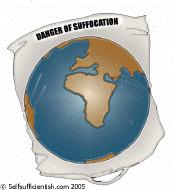Say No to Unwanted Bags
the Carry a Bag campaign
Everything you wanted to know about how plastic bags became a a plague on our shopping habits, and filled our landfills.
And how we can avoid them.
The plastic bag - a short history

Plastic bags were invented in the 1970s, just 3 decades ago.
Nowadays, the UK gets through an amazing 10 billion (not million, but billion) of these things every year - that's more than 150 for every one of us. That works out at about 20 million in Exeter. They are everywhere - cluttering our attics, cupboards and kitchen drawers.
32% of our plastic bags come from Malaysia, 24% from China and 20% from Thailand. Think of the massive CO2 emissions just transporting them to the UK.
The Chinese use an incredible two billion carriers every day. In the US, manufacturers produce around four trillion each year.
In South Africa, the sacks are known as the "national flower" - because so many can be seen flapping from fences, bushes and trees.
Bangladesh slapped a ban on the bags in 2002 after they were found to have been one of the main factors contributing to the 1988 and 1998 floods which submerged two-thirds of the country. Discarded carriers were choking the drainage system.
 But the humble plastic bag now threatens our very existence. Each one takes 1,000 years to decompose and, when it does, leaves toxins in the soil. Plastic bags are responsible for the death of 100,000 marine animals and a million birds a year.
But the humble plastic bag now threatens our very existence. Each one takes 1,000 years to decompose and, when it does, leaves toxins in the soil. Plastic bags are responsible for the death of 100,000 marine animals and a million birds a year.
Our landfill sites are stuffed with them and they make up 50 per cent of the rubbish found on our coastlines. We are wasting valuable oil on unnecessary waste, when we are only 10 years away from Peak Oil.
But the blissful days of ignorance are over. Plastic bags are set to become a dying breed.
European and UK legislation to cut waste, suggests that we must find an alternative.
The alternative to the plastic bag
Paper bags are not an alternative. We say "Paper bags have less capacity for being reused and they require more energy and resources to manufacture and transport than plastic alternatives."
The only viable solution is "Refuse and Re-use":

-
REFUSE: If a shop offers you a plastic bag, politely say "No".
-
RE-USE: Carry your own "Shopping Bag". This can be a strong Cotton or Jute shopping bag. Or it can be the supermarkets "Bag for Life" but these are plastic and not the best. Or you could use a rucksack or duffle bag. Or maybe use a bicycle pannier.
In 2002 Ireland introduced a 9p tax on new plastic bags. Forced to cough up the cash Irish shoippers bought fewer bags and started using Shopping Bags. Plastic bag production fell by 95%.
We should persuade the UK government to do the same.
Durham and Jersey are considering a local tax on Plastic Bags, perhaps Exeter should do the same.
Object to the Incinerator !
|


 But the humble plastic bag now threatens our very existence. Each one takes 1,000 years to decompose and, when it does, leaves toxins in the soil. Plastic bags are responsible for the death of 100,000 marine animals and a million birds a year.
But the humble plastic bag now threatens our very existence. Each one takes 1,000 years to decompose and, when it does, leaves toxins in the soil. Plastic bags are responsible for the death of 100,000 marine animals and a million birds a year.

